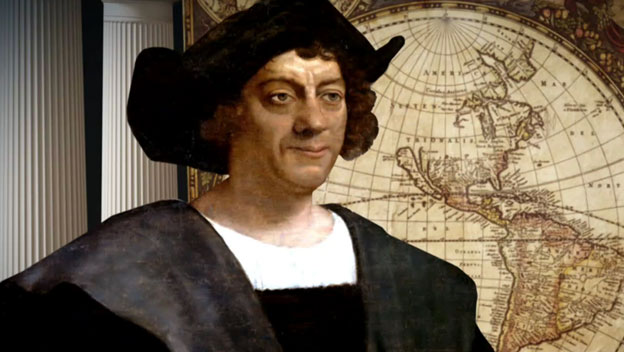
In 1492, Christopher Columbus set out on a journey that would forever change the course of history. Columbus was an experienced explorer who believed that the earth was not only round (many people at this time still believed it was flat), but that it was much smaller than most people believed. He was certain that by sailing west to India and China instead of the typical eastern routes, they could cut the time of the journey and increase the trading activities with those regions.
If at First You Don’t Succeed…
Needing additional financial and man power support to attempt to prove his theory, Columbus took his idea to the Portuguese King, who quickly rejected him. He then took the proposal to the Genoa and Venice leaders, and was rejected by both. Finally, with his options quickly dwindling, he took the idea to the Spanish Monarchy in 1486.
Like in his previous three attempts, Columbus was initially rejected by the Spanish Monarchy in his request for funds and man power to support his western journey. But they were intrigued with his proposal. Spain was in a war with the Muslims at the time and Christopher Columbus would have to wait until it was over to really have his idea considered. But in January of 1492, the Spanish defeated the Muslims, Columbus again pitched his western travel idea, and the Monarchs agreed to give it a go.
Setting Sail
In August of 1492, Christopher Columbus loaded 104 men and all their supplies into three ships and set sail on their journey west to reach China and India. Columbus quickly realized that the distance was much further than he previously thought. But 36 days after they began, Columbus and his men found land, setting foot on the island now known as the Bahamas. Having no idea where he actually was, Columbus believed he was simply on the outer islands of China.
Christopher Columbus return to Spain in 1493 and would make two additional trips West over the next ten years. Though he would never understand the enormity of his discoveries, Columbus would still be credited with opening several new trade routes for Spain and conquering new lands for the Monarchy. Though the lands his ships came upon were already inhabited by other people, history would later credit Columbus with discovering the New World.
As the United States celebrates Christopher Columbus Day today, here are three lessons entrepreneurs can take from his journeys and discoveries:
1. Great Discoveries are Surrounded by Doubting People
When Christopher Columbus formed his theory that sailing west would reach their trade destinations faster, he was met with great doubt. Many people still believed the world was flat, and that sailing too far west would result in Columbus simply falling off the face of the earth, literally. Those who knew the world was round thought the earth was far too big to make it by sailing west. They would be out at sea way too long and would die before reaching India or China.
As entrepreneurs, you will also be faced with many doubts about your ideas and business. We live in a culture that thinks starting a business is risky. People don’t like you trying things they can’t do themselves. As a result your efforts will often be met with doubt and resistance, even from well meaning friends and family.
Great businesses, like discoveries, are made in the midst of doubt.
2. Your First Idea Will Probably Fail
Christopher Columbus thought that by sailing west, he would discover a better trade route to China and India. Fortunately, this idea failed and Columbus did not reach India and China. Instead, he discovered an entire new world.
You too will likely fail in your first ideas for your business. Chances are your success will look nothing like you originally envision it. And that’s OK. Successful entrepreneurs learn to pivot when their initial plans fall through and often find success in areas they never even imaged when they started.
Your first idea will probably fail, but if you learn to adapt, you will find success you never imagined in the beginning.
3. People Don’t Have to be Saints to Learn From Them
Christopher Columbus and his men did some bad things to the people living in the lands they discovered. As the stories of their cruelty become public knowledge, there has been a push by some groups to no longer celebrate Christopher Columbus and his discoveries.
I think this is crap. Just because someone did bad things at some point doesn’t mean we shouldn’t celebrate and try to learn from the great things they did. History is full of men and women who achieved amazing things. Many of these same people also did some really bad things. If we are going to throw out all the successful people who did bad things at some point in their lives, we are missing golden learning opportunities. I’m currently reading Al Capone’s biography and learning a ton of business ideas from him, despite the fact that he was one of the most evil gangsters of all time.
When it comes to mentors, whether in person or just ones you read about in books, learn to take the good and throw out the bad in their successes.
Learn and Celebrate
Christopher Columbus was a man who believed in his ideas even when no one else did. He persisted in the face of doubt and now he is forever remembered as the man who discovered the new world. As we celebrate his life and discoveries today, take the time to think what other ways we can use the lessons he taught us as entrepreneurs.